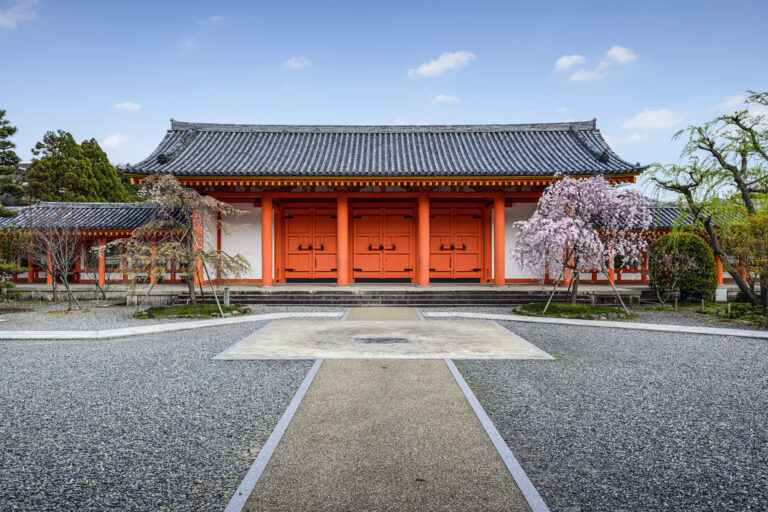Japan is known for its beautiful culture, deep traditions, and unique way of looking at the world.
Some of the most powerful ideas are captured in simple Japanese words. These words don’t always have a direct translation in English, but they embody a whole philosophy.
From finding beauty in imperfection to discovering strength in tough times, these profound Japanese concepts offer gentle wisdom for living with more purpose, peace, and presence.
And you don’t even have to speak Japanese to apply these ideas to your life!
Here are 8 Japanese concepts that might just change the way you see the world.
Wabi-sabi (侘寂)

Let’s start with a beautiful Japanese concept that you may have heard of before!
Wabi-sabi means finding beauty in imperfection and transience. It’s a central concept in Japanese aesthetics, and it reveals a deeply Japanese way of seeing the world.
It’s all about appreciating things that are imperfect, simple, and quietly beautiful. Think of a well-loved, chipped tea bowl, or autumn leaves falling from the trees.
Wabi (侘) means something like ‘simple/austere beauty’ while sabi (寂) refers to a rustic patina or signs of aging. Together, they reflect an appreciation of natural imperfections and the passing of time.
You’ll find this concept reflected in traditional Japanese gardens, old temples, ceramics, and almost all other forms of art and design in Japan.
Kaizen (改善)
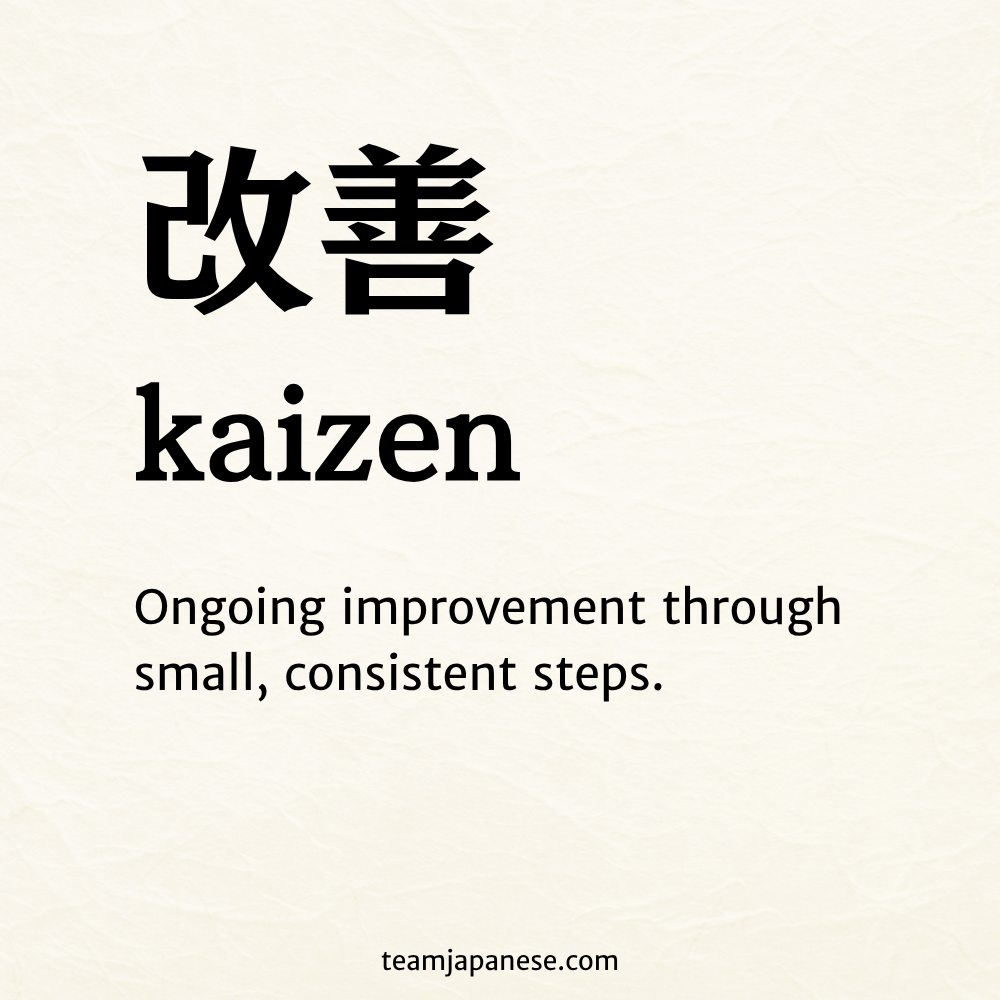
Kaizen is often translated as ‘continuous improvement’. It’s the idea that constant, tiny improvements can lead to big change over time.
It started as a business concept, notably used in Toyota factories. But over time, kaizen has become a philosophy we can all apply to daily life – from tidying your space to building healthier habits.
The kanji kai (改) means ‘change’ and zen (善) means ‘good’. Instead of aiming for perfection overnight, kaizen encourages slow, mindful progress – one step at a time.
Ikigai (生き甲斐)
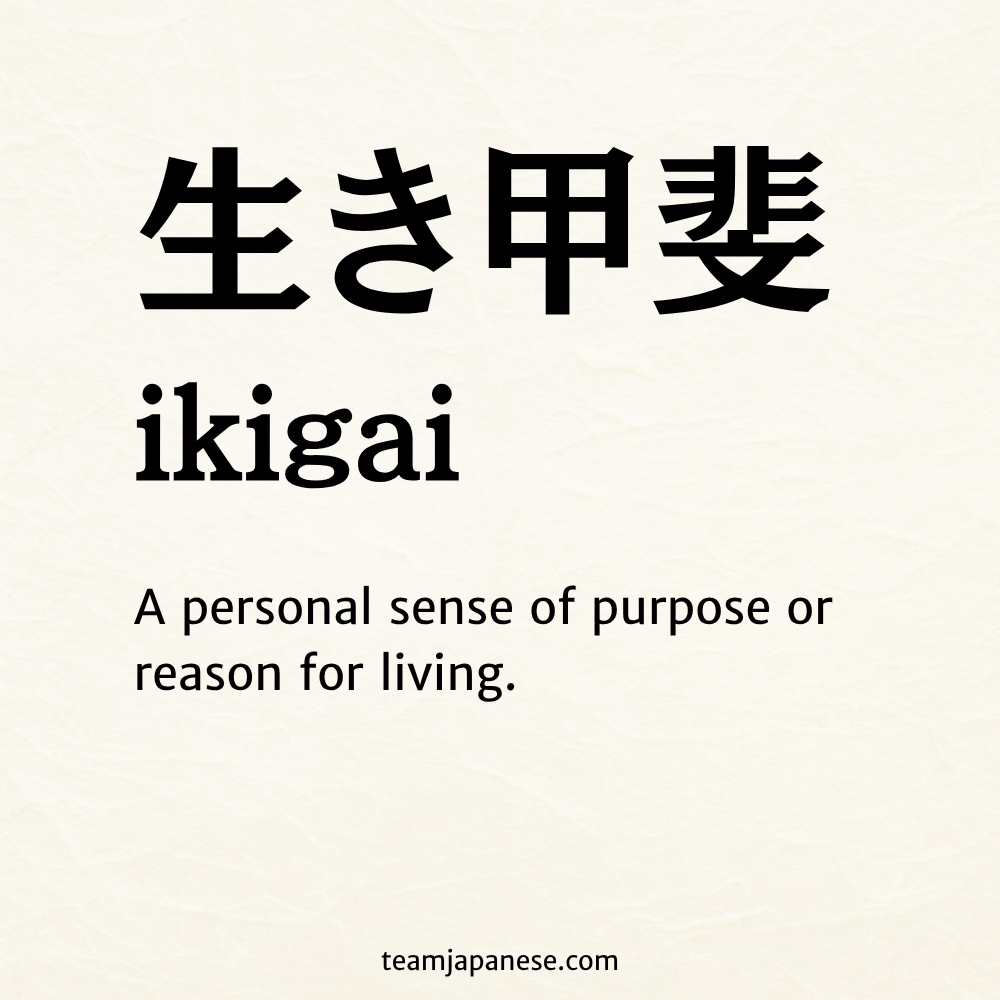
Ikigai is your reason for living. It’s the thing that gets you out of bed in the morning.
Your ikigai doesn’t have to be grand. It could be raising your children, caring for a garden, or a hobby or job you love.
The word comes from ikiru (生きる – to live) and gai (甲斐 – value or worth). It’s personal to each person and reflects the Japanese belief in finding joy and meaning in the everyday, not just big achievements.
Some people believe that finding your ikigai is not just the secret to happiness, but to living a long life!
Gaman (我慢)
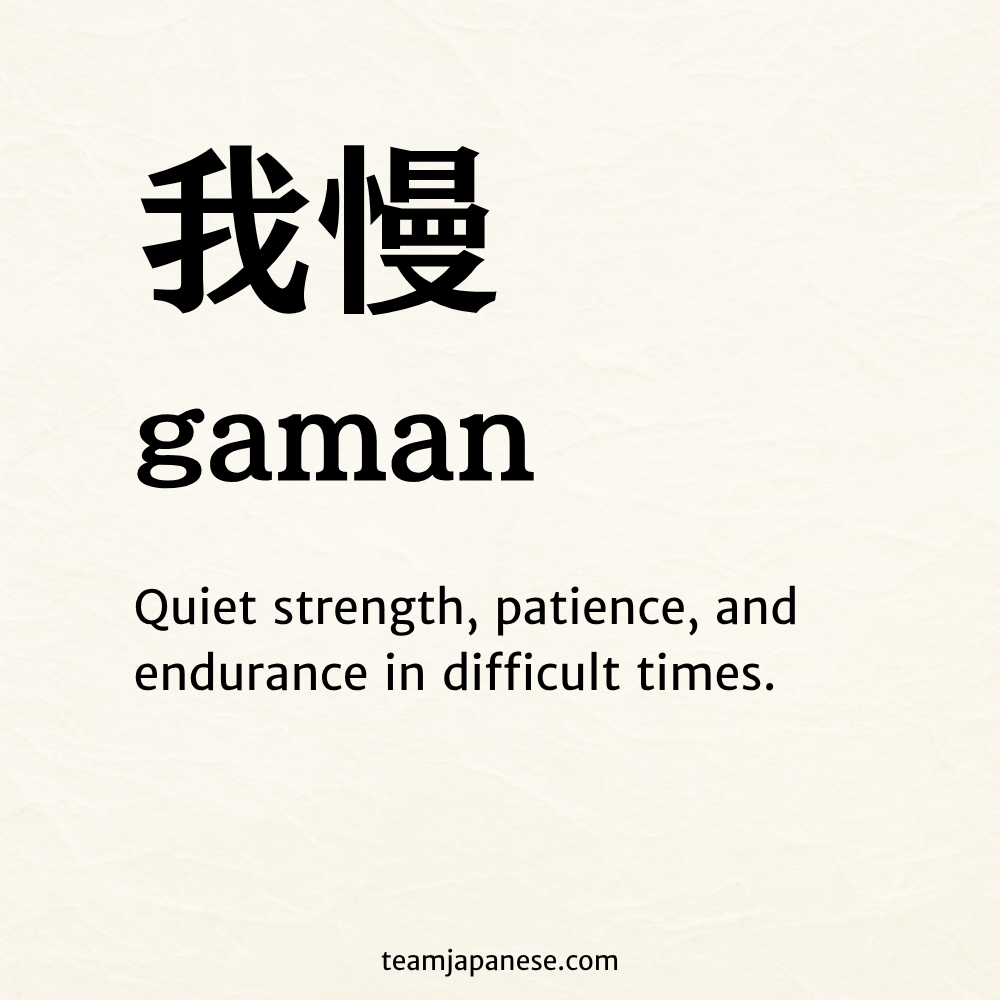
Gaman can be translated simply as ‘patience’ or ‘endurance’, but it’s also a Zen Buddhist term that goes deeper that our understanding of these words in English.
Gaman is the quiet strength to keep going without complaining, even when life gets hard.
This concept is part of how Japanese people often stay calm and composed during crises, showing dignity and self-control.
It doesn’t mean ignoring your feelings, but rather holding yourself with grace and inner strength.
Chisoku (知足)

Chisoku is another concept from Zen Buddhism. It refers to the peaceful feeling of knowing you have enough. In simple terms, be happy with what you have.
The kanji chi (知) means ‘know’, and soku (足) means ‘sufficient’. In Japanese culture, especially in Zen and minimalist thinking, chisoku is seen as a path to happiness – focusing on gratitude rather than always wanting more.
It’s a reminder that joy often comes not from gaining things, but from appreciating what you already have.
Oubaitouri (桜梅桃李)

This beautiful concept is a yojijukugo (four-character idiom) that uses the kanji for four different trees that bloom in springtime: cherry, apricot, peach and plum.
Each of these trees is unique. It blooms in its own time and has its own charm. Oubaitouri reminds us that people are like these trees – we each grow at our own pace and have our own unique strengths.
Oubaitouri is a gentle reminder that we should appreciate our differences and should not compare ourselves to others.
Zanshin (残心)

Zanshin is a concept in Japanese martial arts. It means constant awareness.
It literally means ‘remaining mind’, using the kanji zan (残 – remainder) and shin (心 – heart or mind).
In martial arts, it refers to staying alert and aware, even after the action is over. You should always be aware of your surroundings and ready for the next action.
Although the term is most closely affiliated with martial arts, some draw on this concept to remind them to be present, focused, and mindful in all they do.
Mushin (無心)

Mushin is another term used in martial arts and also in Zen Buddhism.
It literally means ‘no mind’ and refers to having an empty, uncluttered mind – not in a blank way, but in a way where you are totally free from distractions.
The kanji mu (無) means ‘nothing’, and shin (心) is ‘heart/mind’. In Zen, this is the state you aim for in meditation. In martial arts, mushin is a state where you act without hesitation, free from distraction or ego.
Mushin is often compared to being in a ‘flow state’. One key difference is that in the west, we often think of ‘flow’ as something spontaneous, but mushin is something that can be achieved through spiritual discipline.
Start your own journey into Japanese culture
These beautiful Japanese concepts offer more than just words. They invite us to slow down, reflect, and live with more intention.
Whether you’re drawn to the idea of wabi-sabi or inspired by kaizen, each one holds a little piece of wisdom you can carry into your everyday life.
If you’d like to explore more of the beautiful Japanese language and culture behind these ideas, we recommend the free lessons at JapanesePod101!
It’s a great way to deepen your understanding and fall even more in love with Japanese.
JapanesePod101 is our top recommendation to learn Japanese online. We love the fun, current audio lessons and interactive online tools. Sign up for your free lifetime account and see for yourself!
Related posts
- 20 Meaningful Japanese Words to Deepen Your Outlook
- 24 Beautiful and Untranslatable Japanese Words
- 27 Inspirational Japanese Quotes
📌 Pin this for later

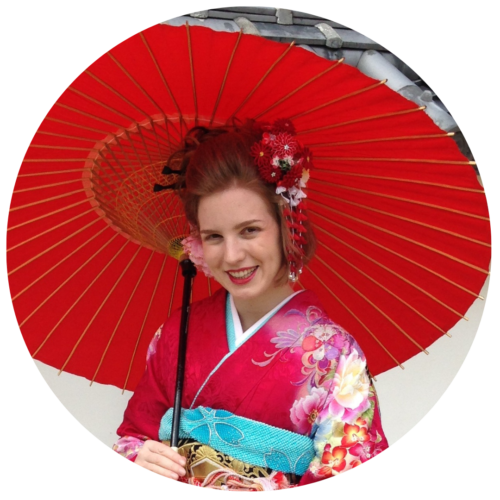
Rebecca is the founder of Team Japanese. She spent two years teaching English in Ehime, Japan. Now back in the UK, she spends her time blogging, self-studying Japanese and wrangling a very genki toddler.
